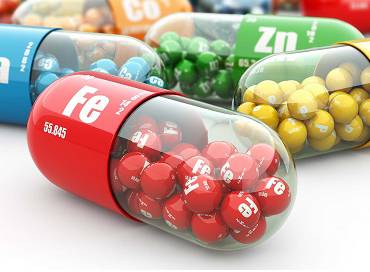Everything You Should Know About Taking Supplements

- Did you know that some supplements are better taken with meals while others should be taken on an empty stomach? And that some vitamins and minerals interact with each other and should be taken separately? Or how to find a reputable, safe supplement brand? In this blog, we reveal everything you should know about taking supplements, including which ones to take, when and how to take them, how to pick safe types, and much more.
- Before taking any nutritional supplements, always consult a medical doctor. If you’re pregnant, nursing, have or suspect a medical condition, or are taking any medications, please consult a doctor before acting on any of our recommendations.
Which supplements should I take?
- Supplements should be taken to address low or deficient micronutrient levels, or when they will help a specific need. It’s important to have your blood levels checked periodically to understand if taking a vitamin or mineral is right for you. For example, vitamin D deficiency is one of the most common nutrient deficiencies across the globe. Its best source is sunlight, as it has a minimal presence in food. A lack of exposure to sunlight, therefore, makes the vitamin particularly difficult to come by. Oftentimes, taking a vitamin D supplement is a safe and simple way to maintain optimal levels.
- Iron is also a common deficiency, particularly in premenopausal females and athletes. But proper iron supplementation can help prevent entering a low or deficient blood iron range.
- Interestingly, sometimes our genetics can help explain which supplements we should take. Specific genes can make it difficult to sustain optimal biomarker levels like cholesterol or inflammation, regardless of lifestyle. It’s for this reason that learning more about your genetic predispositions through DNA testing can help you determine if supplements might finally nudge specific biomarkers in the right direction.
Should I take a multivitamin?
Multivitamins may contain 500% or more of the recommended amount of specific micronutrients, many of which your body may not need at all. Over time, this may increase certain blood biomarker concentrations to undesirable levels. For example, taking a multivitamin with 16,000% (see below) of your vitamin B12 needs could result in above-optimal blood levels of B12. Some micronutrients in multivitamins even compete for absorption (e.g. calcium and iron), which can potentially interfere with your body’s absorption of nutrients you actually need.
When to take fat-soluble vitamins
The best time to take fat-soluble vitamins is with a meal or snack containing fat. Fat-soluble means that the vitamin will dissolve in fat, and because dietary fat (like an avocado) moves across the cell walls of the small intestines after it’s digested, the dissolved vitamins will also be absorbed and carried into the bloodstream. The fat-soluble vitamins are vitamins A, D, E, and K.
Note, that fat-soluble vitamin supplements should only be taken if a blood test indicates you’re low or deficient. The body stores fat-soluble vitamins in fat (or adipose) tissue. Taking unnecessarily-high doses of these vitamins may accumulate in the body, resulting in toxicity. In this section, we touch upon each fat-soluble vitamin to clear up any conflicting information about them.
Vitamins A & E
Currently, Test for vitamin A and E, as both are present in a range of foods and testing is usually reserved for a clinical setting. Unfortunately, because the supplement industry is unregulated, many companies sell both vitamins at doses beyond the Tolerable Upper Intake Level (UL or upper limit) established by the Food and Nutrition Board. Taking vitamin A in doses greater than the 10,000 IU upper limit may lead to nausea, vomiting, double or blurred vision, headaches, dizziness, and lack of muscle coordination— all signs of hypervitaminosis A, also known as vitamin A toxicity. Supplementing with vitamin E may also lead to adverse health effects. High doses of the vitamin—above the upper limit of 1,500 IU per day—can interfere with vitamin K’s role in the body, increasing your bleeding risk.
Achieving an adequate amount of these vitamins through diet should, therefore, be a priority. For vitamin A, focus on foods like sweet potato, spinach, pumpkin, carrots, herring, eggs, salmon, and tuna. Instead of vitamin E supplements, ensure your diet includes foods rich in the vitamin, like sunflower seeds and butter, wheat germ, almonds, avocado, spinach, butternut squash, and kiwi.
Vitamin D
Unlike vitamins A and E, vitamin D is much harder to obtain through food, which has resulted in deficiencies across the globe. Fortunately, Vitamin D status can be easily determined via blood testing and corrected with a supplement if needed. Checking your blood periodically allows you to adjust your supplement dosage accordingly. Doses ranging between 1,000-5,000 IU are safe for increasing and maintaining levels, whereas high doses of 10,000 IU per day for several months may lead to toxicity.
Vitamin K
Vitamin K blood tests are not widely available, rarely ordered, and almost exclusively used by clinicians. Toxicity of vitamin K is rare, and no upper limit has been established. However, vitamin K, like vitamin D, is actively involved with calcium metabolism and bone health. Vitamin D helps your body absorb calcium more efficiently, while vitamin K assists in transporting calcium to bones, helping prevent calcium build up in the arteries. MK-7 is a specific form of vitamin K that activates a protein used in bone formation, making bones harder and stronger. Taking an MK-7 supplement has been associated with significant improvements in vitamin K status and decreased age-related bone loss.[3-6]
This review claims that vitamin D and calcium supplementation paired with a vitamin K deficiency may lead to deposits of calcium in soft tissues, which can cause the hardening of blood vessels over time. So, in general, research indicates that it’s essential to maintain optimal levels of all three for proper bone and cardiovascular health. In other words, if you currently supplement with vitamin D and calcium, consider taking vitamin K as well.
When to take water-soluble vitamins
Water-soluble vitamins consist of vitamin C and the eight B vitamins (thiamine, riboflavin, niacin, pantothenic acid, B6, folate, biotin, and B12). Water-soluble means these vitamins dissolve in water and don’t need to be taken with food to be absorbed by the body—a big glass of water is all you need. With the exception of B12, water-soluble vitamins are not stored in the body for long periods of time, most only lasting for a few days. Excess amounts taken through food or supplements are generally excreted in the urine. Below we review two water-soluble supplements commonly taken in supplemental form—vitamin B12 and vitamin C.
Vitamin B12
Vitamin B12 is almost exclusively found in animal foods like fish, beef, and eggs. Because vitamin B12 doesn’t naturally exist in many plant foods, it’s vital that those who follow a plant-based diet find alternative sources of it. Fortunately, many food products are fortified with the vitamin in amounts close to the daily requirement (2.4 mcg), including cereals, breads, and some non-dairy milks. Supplements, on the other hand, usually contain B12 in quantities that significantly surpass the daily requirement—sometimes by 500-20,000%.
People often assume that, because B12 is a water soluble vitamin, the body excretes it daily. However, our body can store one to two years’ worth of the vitamin, primarily in the liver. No upper limit has been established for B12 because of its low potential to cause toxicity. supplementation, and experience side effects including rash, itchy dry skin, fatigue, and trouble swallowing. If you take B12 in large quantities, consider reducing the frequency and/or dosage of your supplement. Depending on the dosage, taking it only once or twice per week may suffice.

Vitamin C
Vitamin C is a popular supplement, often taken to combat a cold. But interestingly, vitamin C’s absorption decreases with increased intake. More specifically, only 16% is absorbed at high intakes (~12g) versus 98% absorbed at low intakes (<20mg). Once you hit 1,000mg (a typical supplement value), approximately less than 50% of the vitamin C you consume will be absorbed—and the rest will just be excreted in the urine. Therefore, vitamin C is best taken in two to three smaller daily doses of 100-200mg.
Toxicity of vitamin C is unusual, but adverse effects may occur if you supplement above the upper limit (2,000mg per day) in the long-term. As a water-soluble vitamin, vitamin C is never stored for very long in the body and we therefore must focus on eating vitamin C-rich foods like kiwi, berries, and broccoli every day to meet our needs.
When to take minerals
Most minerals should be taken separately, as many of them compete with each other for absorption. For example, calcium and iron should never be taken together, nor should magnesium and calcium (despite the fact that many supplement brands combine magnesium, calcium, and vitamin D into one pill). Below, we detail a few minerals commonly taken in supplemental form.
Iron
Iron deficiency is one of the most common nutritional deficiencies across the globe, especially in women, yet stored iron is not routinely checked by physicians. Ferritin, a protein that stores iron, is the best indicator of the amount of iron in the body. A simple ferritin blood test can provide insight into your iron levels. If you are low or deficient in the mineral, a combination of iron supplementation and iron-rich foods can help restore levels.
Iron pills is best taken on an empty stomach in small doses. The body can only absorb a limited amount of iron at one time, so you can maximize absorption by taking it in more frequent, smaller doses (~14mg at once appears to be best). Furthermore, you can enhance its absorption by combining it with vitamin C sources like orange juice, citrus fruits, bell peppers, or a vitamin C supplement of around 75mg. Foods and beverages containing calcium (like dairy products) and tannins (found in green tea and coffee) decrease the absorption of iron. Lastly, iron supplements should be taken several hours after engaging in any physical activity to ensure optimal absorption.
Magnesium
Magnesium is widely available in foods, however, surveys suggest that many Americans consume less than adequate amounts of the mineral. 9% of females and 6% of men discover they have low magnesium levels. Similar to iron, magnesium is best taken on an empty stomach, either one hour before or two hours after a meal. Calcium inhibits magnesium’s absorption, while vitamin D enhances it. If magnesium intake from food is low, the kidneys prevent magnesium from being excreted. The maximum dosage from supplements should never exceed 350mg, as high doses can cause diarrhea, nausea, and abdominal cramps.
Calcium

Calcium absorption from supplements varies between approximately 27-39%, depending upon the calcium used—for best absorption choose calcium citrate malate or calcium sulfate. Taking a calcium supplement with food typically enhances absorption. Absorption is also higher when calcium is taken in amounts less than 500mg, and when paired with vitamin D. Interestingly, if your diet is low in calcium, your body will absorb more from your food or supplement. Caffeine, iron, and fiber can all decrease calcium absorption. Adults should never surpass 2,500mg of calcium supplementation, and those over 51 should never take more than 2,000mg. Intakes above these levels from food and supplements can cause constipation, the formation of kidney stones, and potentially increase the risk for heart disease.


